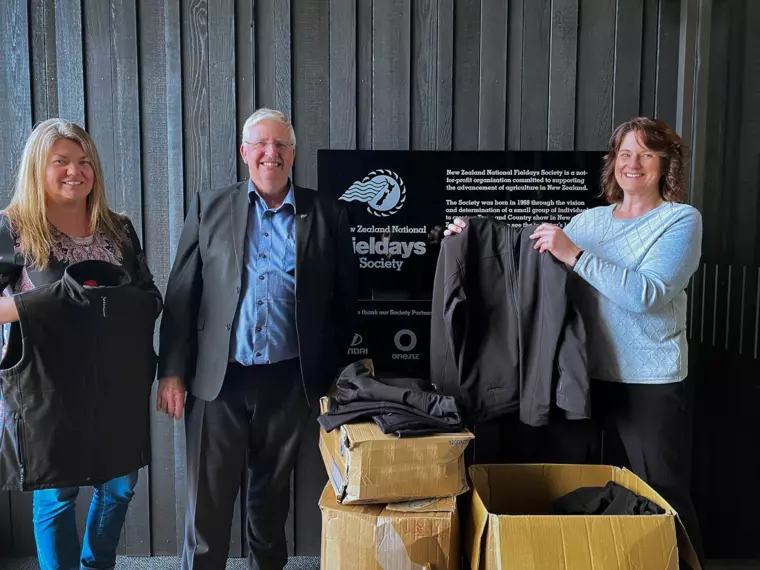
Quick Links
Donation to support Ark Quest Trust
The Society, with the help of Jan Dean, is pleased to have been able to donate NZNFS uniforms that are no longer being used due to outdated logos and brands to the Ark Quest Trust. This trust is working hard to support a community and school in Kenya with everything from clothing to agriculture assistance.
Tell us about your background and what inspired you to get involved with supporting communities in rural Kenya.
During a school trip to Kenya, I had the opportunity to assist in the building of the Ark Quest Education Centre, a school established by Calvine Ominde. Calvine grew up in a poor family, but his family supported him through high school. He persevered and went on to university but struggled to find work and pay his tuition fees. To give back, Calvine decided if he could get through university, he would pay to educate another child.
When I met Calvine, the school had been running for several years, largely funded by Calvine and run by volunteers. As the demand for education grew, the school expanded and began to hire staff. At this point, a small group of us decided to create a trust to support the school.
What is the Ark Quest Trust, and how did you come to collaborate with them for this initiative?
Ark Quest Trust is a small trust set up by Phillip Russell (The teacher who led the trips to Kenya) and me in 2014. Phillip had met Calvine on a previous trip and they had formed a friendship. This led to further trips to assist with building and supply of resources. Our goal is simply to raise funds to allow the school to continue to function. It is a private school and the students theoretically pay fees. The reality is that few can afford to do so. Because we can see how education is transforming not just the lives of the students, but also benefiting the wider community, we will continue to support them until they can become self-sustaining.
What is the process of collecting and donating expired uniforms from The Society to the Ark Quest Trust? How did this idea come about?
The idea for distributing expired uniforms in Kenya came about after a discussion with a neighbour, mentioning the availability of the uniforms at the Society and enquiring if it was possible to get them to Kenya. I responded with a Yes, and it developed from there. We have visited Kenya four times so far with another trip planned for next year. On each visit, we take the clothing along with us and distribute it with the help of the school staff.
How do these donated uniforms make a difference in the lives of the children and families in the village?
Many of the families live in the sort of poverty we cannot imagine and have little money for clothing. New clothes are not a possibility for them. The raincoats have been the most useful item from the Society. It rains a lot! Few of the children own clothing that protects them from the rain. The school staff also benefit as they are given some of the larger items.
What challenges did you face while implementing this donation initiative, and how did you overcome them?
There are few challenges that we cannot cope with. Getting the clothing to Kenya is the biggest challenge as it is not practical to ship or air freight it, so it must be taken by those of us who visit. When we go, everyone on the trip takes 15kg of their own clothing and 15kg of donated clothing. Where we have had too much clothing, we have given some to Missions teams from Bethlehem College who take it to in-need villages in Samoa, Fiji and the Solomon Islands.
Beyond uniforms, what other kinds of support does the Ark Quest Trust provide to the village and local school? How does this comprehensive approach contribute to sustainable development?
We send money every month to ensure that the salaries of the staff can be paid. We have also raised money to begin building a permanent concrete block school. The present school is made of eucalyptus poles and mud bricks and being 10 years old, it is beginning to fall apart. A new permanent school will also hopefully attract new students who can pay the fees, which will help to support the school. The Ark Quest Education Centre is working on various projects to promote sustainability. One of these projects is a dairy that produces milk for sale, along with raising chickens and geese for eggs and meat. Additionally, some classes cultivate crops and sell their produce. The goal is for the school to become self-sustaining. The Centre employs 26 people, including teachers, guards, cooks, and agricultural workers. This provides a means for these individuals to support their families in an area where job opportunities are scarce.
What advice would you give to others who aspire to initiate similar projects that bridge international partnerships for community development?
Do not initiate! Find local people who have the initiative and get behind them with support. Community development is most effective when run by the local people, who understand how things work in their country and community. Take care to not impose your cultural norms or beliefs onto people from another culture.


